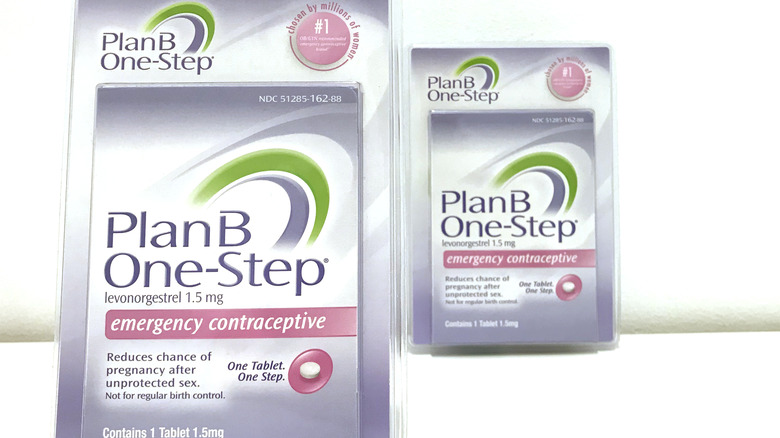Take Action Vs. Plan B: Which Morning-After Pill Is Right For You?
If you find yourself in need of emergency contraception, you have a couple of options. Maybe you missed a dose of your birth control or took antibiotics, or a condom broke (via Verywell Health). There are many reasons you might need an emergency backup to help prevent pregnancy. If you find yourself in that situation, maybe you reach for Plan B or Take Action.
According to Difference Between, some people also call these emergency contraceptives the morning after pill because you should take them the morning after or within 72 hours of having unprotected sex. However, it's important to note that neither drug protects against sexually transmitted infections, and it's not something you should regularly rely on to prevent pregnancy. They also both have side effects that include vomiting, nausea, and possible breakthrough bleeding, which are reasons that Planned Parenthood advises against using them regularly instead of other hormonal or barrier methods of birth control.
So what is the difference between Plan B and Take Action? Read on to find out.
The main difference between Take Action and Plan B is the price
If you need emergency contraceptives, Plan B and Take Action work best when taken within 72 hours of unprotected sex. Still, Planned Parenthood noted that you could also take it as long as 120 hours after unprotected sex with lesser results. Both pills contain levonorgestrel as their active ingredient (via Difference Between). Take Action is a generic brand of Plan B. The former is a one-pill dose with a higher concentration of the active ingredient, while the latter can come in two pill or one pill formulations. They're available over-the-counter, but Difference Between noted that Plan B might be easier to find. According to Very Well Health, Take Action costs about 20% less than Plan B, and the publication recommended possibly keeping some on hand.
Scientists believe that these types of pills work by preventing ovulation if you haven't already ovulated, or they help keep the sperm and egg from meeting to form a pregnancy. Regardless of which one you choose, the sooner you take it after unprotected sex, the better. If you have any questions, talk to your doctor about which medication would work best for you.

